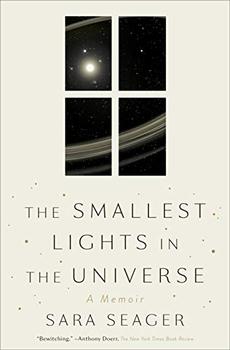Summary | Excerpt | Reading Guide | Reviews | Beyond the book | Read-Alikes | Genres & Themes | Author Bio

A Memoir
by Sara SeagerIn this luminous memoir, an MIT astrophysicist must reinvent herself in the wake of tragedy and discovers the power of connection on this planet, even as she searches our galaxy for another Earth.
Sara Seager has always been in love with the stars: so many lights in the sky, so much possibility. Now a pioneering planetary scientist, she searches for exoplanets—especially that distant, elusive world that sustains life. But with the unexpected death of Seager's husband, the purpose of her own life becomes hard for her to see. Suddenly, at forty, she is a widow and the single mother of two young boys. For the first time, she feels alone in the universe.
As she struggles to navigate her life after loss, Seager takes solace in the alien beauty of exoplanets and the technical challenges of exploration. At the same time, she discovers earthbound connections that feel every bit as wondrous, when strangers and loved ones alike reach out to her across the space of her grief. Among them are the Widows of Concord, a group of women offering advice on everything from home maintenance to dating, and her beloved sons, Max and Alex. Most unexpected of all, there is another kind of one-in-a-billion match, not in the stars but here at home.
Probing and invigoratingly honest, The Smallest Lights in the Universe is its own kind of light in the dark.
As a recent widow myself, I found her writing both poignant and instructive. I almost felt like I was a member of The Widows of Concord, Sara's support group. A great, great read (Wendy A). I have already recommended this memoir to my book club, as most of it is an easy read due to the writer's skill in weaving her personal and public lives into a memoir that reads like a novel (Carol C). As an astrophysicist, her enthusiasm and devotion in attempting to discover life in other universes was captivating (Darlene G)...continued
Full Review
 (608 words)
(608 words)
(Reviewed by First Impressions Reviewers).
 Sara Seager, the author of The Smallest Lights in the Universe, is an astrophysicist who served as a chairperson on NASA's Starshade Project, a mission to locate intelligent life on planets outside of our Solar System, a.k.a "exoplanets" ("exo" is a Greek prefix meaning "outside"). Exoplanets are challenging to discover, in part because the nearest ones are still light years away from Earth. As of this writing, astronomers have discovered over 4,000 exoplanets from 703 distinct planetary systems.
Sara Seager, the author of The Smallest Lights in the Universe, is an astrophysicist who served as a chairperson on NASA's Starshade Project, a mission to locate intelligent life on planets outside of our Solar System, a.k.a "exoplanets" ("exo" is a Greek prefix meaning "outside"). Exoplanets are challenging to discover, in part because the nearest ones are still light years away from Earth. As of this writing, astronomers have discovered over 4,000 exoplanets from 703 distinct planetary systems.
NASA describes the goal of its exoplanet research program as "to discover and characterize Earth-like planets around our nearest neighbors, search for habitable conditions on those planets, and uncover signatures of life." They've used a ...

If you liked The Smallest Lights in the Universe, try these:

by Lisa Kaltenegger
Published 2025
Riveting and timely, a look at the research that is transforming our understanding of the cosmos in the quest to discover whether we are alone.

by Sarah Moss
Published 2025
An unflinching memoir about childhood, food, books, and our ability to see, become, and protect ourselves.